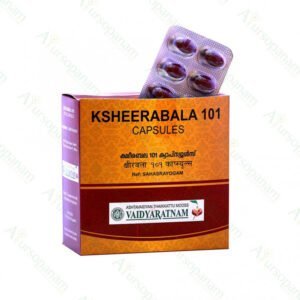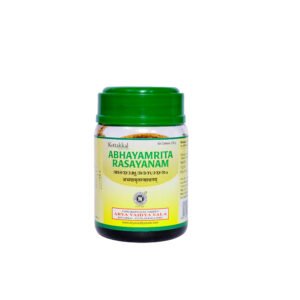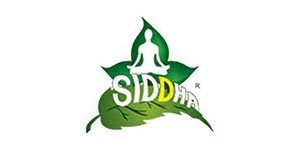Valiya Madhusnuhi Rasayanam harnesses the excellent anti-oxidant property of Smilax and the potent wound healing property of Gandhaka Bhasma (incinerated Sulphur) in a nourishing base of jaggery, ghee and spices. It is traditionally used in the management of chronic and debilitating diseases like Rheumatoid arthritis, Gout, Syphilis and inflammatory disorders of the skin. The sweet base makes it palatable and easy to use.
‘Madhusnuhi’ is the Sanskrit name of Smilax china, the signature drug in this rejuvenative combination. It is a woody wine native to Southern China, India, Nepal, Japan, Taiwan, Korea, Philippines, Myanmar, Vietnam and Thailand. The rhizomes have exhibited anti-inflammatory, anti-cancer and anti-oxidant properties in cell-line studies.
Features & Benefits
- Diseases like rheumatic arthritis, gout, psoriasis, irritable gut are characterized by chronic inflammation, pain and loss of function.
- Valiya Madhusnuhi Rasayanam is an important formulation used in traditional medicine for countering inflammation.
- It draws out deep inflammation from the body. Valiya Madhusnuhi Rasayanam also relieves pain and swelling associated with chronic inflammation.
- The avaleha form make the formulation suitable for long-term use. It sustains the effect of treatment in the body. Routinely used for the continued healing process.
- Valiya Madhusnuhi Rasayanam ensures regular and easy bowel movements.
Dosage and Instructions
Adult: 5-10 gms Valiya Madhusnuhi Rasayanam once daily, as recommended by the Physician.Child: 3-5 gms Valiya Madhusnuhi Rasayanam once daily, as recommended by the Physician.
Key Ingredients
Madhusnuhi (Smilax china)
Madhusnuhi helps manage diabetes by enhancing insulin secretion due to its antioxidant and anti-inflammatory properties. As per Ayurveda, consuming Chopchini powder along with lukewarm water improves digestion and appetite due to its Deepan (appetizer) property. It is useful in skin problems. It manages skin inflammation and allergic reactions by inhibiting the histamine release due to its anti-allergic property. Applying Chopchini cream on the skin helps to manage psoriasis by inhibiting the growth of microorganisms due to its antipsoriatic property
Punarnava (Boerhaavia diffusa)
Punarnava, a potent Ayurvedic has immense health benefits and has been in use since ancient times in treating a host of health anomalies. Commonly known as Hogweed, Sterling, Tarvine in English, Mukarati Kirei in Tamil, Raktakunda, and Shothaghni in Sanskrit, it goes by the botanical name Boerhavia diffusa. Punarnava has powerful analgesic and anti-inflammatory properties, which is extremely beneficial in reducing joint and muscle pain, thereby reducing the chances of chronic autoimmune inflammatory diseases like rheumatoid arthritis.
Guduchi (Tinospora cordifolia)
Guduchi is a well-recognized and widely distributed traditional plant that is used successfully in Indian Ayurveda medicine. Guduchi helps increase the effectiveness of protective white blood cells which fight infection. The herb also augments immune responses to infections by influencing various immune effector cells and ensures early recovery. Its effective in Infections in the respiratory system, skin, and soft tissues, infected wounds, especially in diabetic conditions and immune compromised conditions.
Hareethaki (Terminalia chebula)
Popularly known as Indian walnut for its innumerable benefits or Indian hog plum in English, it is extremely valuable for its role in improving hair health. It is useful for treating scalp infections like dandruff, itching and hair fall. It also strengthens them from the roots, prevents breakage and loss of hair and bestows silky soft smooth hair. Chebulic Myrobalan is one of the three key ingredients in Triphala, a natural compound that provides overall support for digestive function and helps ensure that the digestive tract works at optimal levels. The Ayurvedic Pharmacopoeia of India has documented the use of the powdered herb in intermittent fevers and chronic fevers, anemia and polyuria. Chebulic Myrobalan can also be used to treat gastrointestinal and respiratory disorders.
Amalaki (Emblica officinal)
Commonly known as the Indian gooseberry is high in Vitamin C and natural antioxidants known as flavonoids and polyphenols. When used for hair treatments, it is found to strengthen and condition follicles down to the roots. Amla oil can promote hair growth, reduce dandruff, and prevent the graying of hair.
Vibhithaki (Terminalia Bellerica)
Known as beach almonds or Bedda nut tree, it is rich in Vitamin C and other antioxidants that nourishes the hair roots. Bibhitaki helps in making the roots of the hair stronger, minimizing hair fall and preventing premature graying of hair strands.
Pippali (Piper longum)
Pippali is known as “Tridoshic” herb as it suits all body types. Thus regular consumption of Pippali in suggested quantity can help you to immune your body to quiet an extent. Pippali has Anti-microbial, Anti-inflammatory activity. Consumption of Pippali is said to exhibit anti spasmodic action and hypoglycaemic effect which is believed to lower blood sugar level. It is also reported to be antagonist in respiratory depression. Also due to its cooling post-digestive effect consumption of Pippali is considered as a safe and effective option to avoid all sorts of digestive disorders.
Maricha (Piper nigrum)
Black pepper is native to Western Ghats of India. It is cultivated for its fruit, which is widely used as spice and in traditional Indian medicine preparation. Black pepper is an appetizer and carminative commonly used in the treatment of digestive system related complaints like dyspepsia, indigestion, flatulence, nausea, diarrhoea and colic pain. in respiratory system it acts like expectorant used in cough, cold and chest congestion. Externally used as analgesic and in vitiligo it stimulates the production of pigments.
Shunti(Zingiber officinale)
Due to its strong flavor, Ginger is an essential ingredient in many Asian cuisines. Its therapeutic benefits have been recorded in Ayurvedic and Traditional Chinese Medicine. Ginger is a potent anti-nauseatic and is beneficial in treating upset stomach.Gingerol and shogaol, active components of Ginger, suppress gastric contractions. Both the fresh and dried rhizomes of Ginger suppress gastric secretion and reduce vomiting. The compounds 6-gingerol and 6-shogaol have a number of pharmacological properties, including antipyretic, analgesic, antitussive and hypotensive properties.
Ela (Elettaria cardamomum)
Commonly used as Elaichi, it has a very good anti-bacterial and anti-fungal properties. It helps in reducing inflammation. Cardamon is often given the epithet ‘Queen of Spices’ as it is used to flavor food in many countries. in addition, the herb has several health benefits. The German Commission E has indicated the use of Cardamom in dyspepsia and as a cholagogue, which promotes bile discharge from the system. The herb is also helpful in treating gum and teeth infections, throat congestion and kidney disorders
Twak (Cinnamom verum)
Cinammon is used for management of neurological disorders, cardiovascular diseases, oxidative stress, inflammatory disorders, diabetes, microbial infections, cancer and other conditions extensively in Ayurveda.
Vidanga (Embelia Ribes)
Commonly known as false black pepper, it has various medicinal properties and is used in various ayurvedic formulations.Vidanga is generally used to expel worms and parasites from the stomach due to its anthelmintic properties. It is beneficial for indigestion and also helps to manage constipation due to its laxative property.
Rasna(Alpinia Galanga)
Rasnais a rhizome grown in most of Southeast Asia and is used in cooking and home made remedies. Rasnaplant is used in many Ayurvedic medicines in India, Tibet, Africa to help with inflammation, bronchitis, asthma, cough, indigestion, piles, joint pains, obesity, diabetes. The paste of the leaf is also applied externally to reduce swelling.
Krishna Jeeraka (Nigella sativa)
Commonly known as fennel seeds, this spice is boiled in water and used as drinking water. Fennel seeds stimulate the digestive enzymes which reduce bloating. It is also used as a liver tonic, digestive, antidiarrhoeal, and to control parasitic infections and boost the immune system. The seeds of Sativa are widely used in the treatment of various diseases like bronchitis, asthma, diarrhea, rheumatism, and skin disorders. It is also used as a liver tonic, digestive, anti-diarrheal, appetite stimulant, to increase milk production in nursing mothers to fight parasitic infections and to support the immune system.
Jeerakam (Cuminum cyminum)
According to Ayurveda, Cumin or Jeerakam is the one that can balance the 3 doshas. in India, Cumin has a history of more than 5000 years and it is one of those ingredients that is most commonly used, every day in Indian cuisine. Ayurveda also calls it nature’s best tonic and the word meaning of ‘Jeera’ in Sanskrit is that which helps with digestion.
Jatamansi (Nardostacys jatamansi )
It has a very good anti-oxidant and anti-inflammatory property that helps to reduce premature hair graying and hair growth. the therapeutic benefits of Musk Root have been documented in various Ayurvedic texts. The herb is recommended for combating stress and insomnia. It is also known to enhance memory and treat mental instability. Cardiotonic properties have also been attributed to Musk Root.
Kushtam (Sausseria lappa)
It is a well used drug in Ayurveda that has a good anti-inflammatory and anti-bacterial property. It also helps in preventing infections. The roots contain resinoids, essential oils, alkaloids, insulin and other minor constituents like tannins and sugars. The root (containing both the essential oil and alkaloid saussurine) is used to treat asthma, by relaxing the bronchioles. The herb’s gum-resin has significant anti-inflammatory properties. The gum-resin is used in treating osteoarthritis, juvenile rheumatoid arthritis, soft tissue fibrositis and spondylitis. The essential oil derived from the gum resin has antifungal properties.
Chithraka (Plumbago zeylanica)
Chitraka is a potent digestive medicine used for treating a host of ailments including indigestion, constipation, anorexia, abdominal distension, stomatitis, abdominal pain, etc. Imbued with digestive, caustic, stimulant and carminative properties, it eliminates harmful AMA toxins from the body which has accumulated due to malabsorption of food particles.
Sariva (Hemidesmus indicus)
Sariva, is a semi-erect herb that has various phytoconstituents. These compounds add medicinal value to the herb. Sariva has been used in the Ayurvedic system of medicine for many years. It is used in the treatment of conditions like skin disorders, diarrhea, dysentery, eye diseases, syphilis, leukoderma, dyspepsia, chronic fever, leprosy, asthma, and others.
Aswagandha (Withanya somnifera)
Ashwagandha is commonly used for stress. It is also used as an “adaptogen” for many other conditions, but there is no good scientific evidence to support these other uses. Ashwagandha contains chemicals that might help calm the brain, reduce swelling (inflammation), lower blood pressure, and alter the immune system. The root contains steroidal compounds which include the lactones Withaferin A and carbon-27-glycowithanolide, known collectively as the Withanolides. The Withanolides are responsible for the varied medicinal applications of the herb. Winter Cherry also contains a fair amount of alkaloids including tropine, pseudotropine, isopelletrine, anaferine and saponins, which impart medicinal properties to the herb.
Gandhaka Bhasma (Incinerated sulphur)
Gandhaka or sulphur is purified using milk and ghee repeatedly and subjected to incineration. The product obtained is hailed by Ayurveda as the elixir for health and longevity. It has potent anti-inflammatory and analgesic action. It is renowned for its therapeutic potential in healing chronic wounds and inflammatory disorders.
















































Ratings & Customer Reviews
Reviews
There are no reviews yet.